Impact of Information Systems on Business Organizations - MIS 2101
VerifiedAdded on 2023/06/15
|6
|1422
|278
Essay
AI Summary
This essay examines the significant impacts of information systems on business organizations, addressing their role, technical and operational challenges, and the relationships among ethical, social, and political issues. It explores how information systems provide competitive advantages, support decision-making, and influence global operations. The essay further discusses the importance of strategic information systems planning and the challenges posed by economic crises. Ultimately, it emphasizes that a well-managed information system is crucial for an organization's function, performance, and productivity, making information technology a vital component of modern business success. Desklib offers a variety of resources, including past papers and solved assignments, to aid students in their studies.
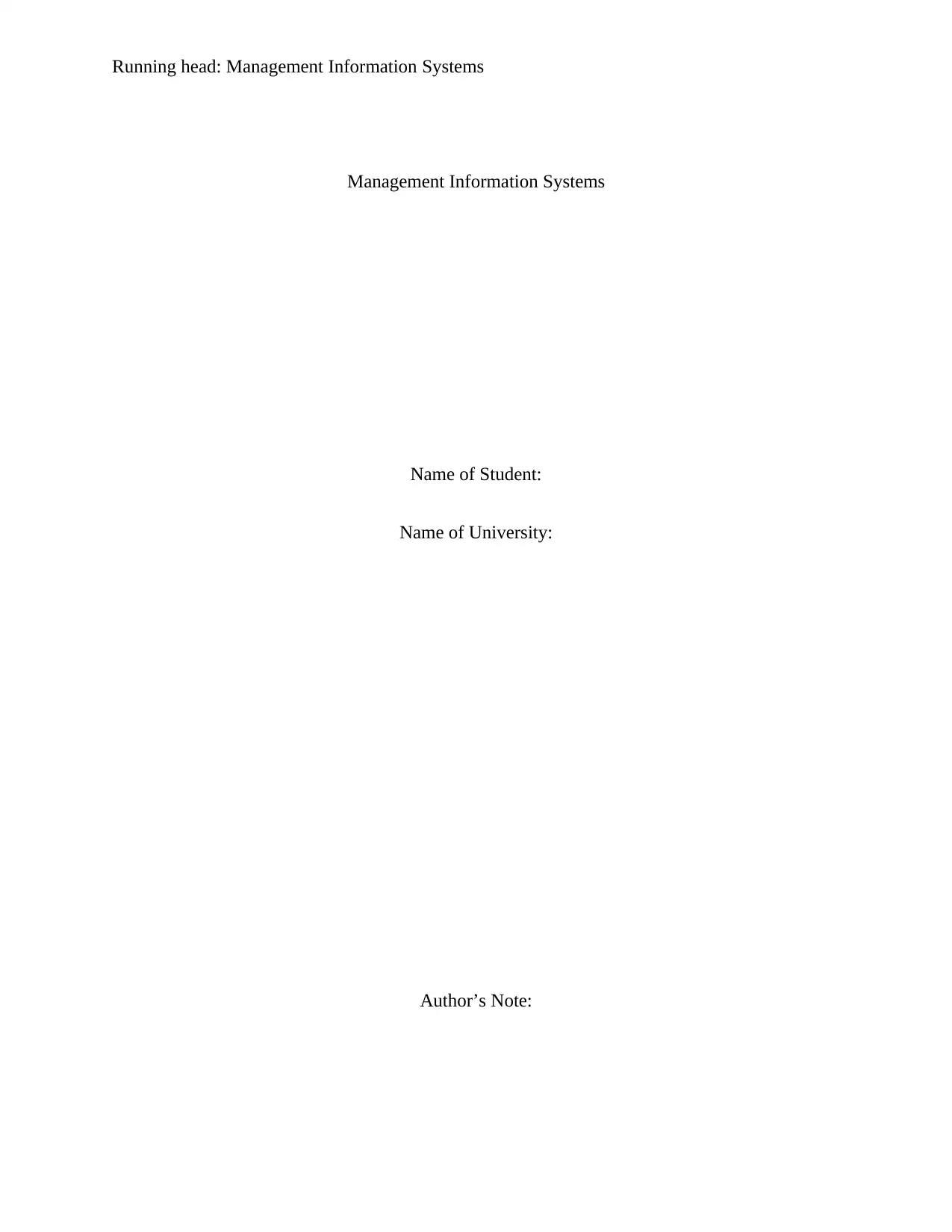
Running head: Management Information Systems
Management Information Systems
Name of Student:
Name of University:
Author’s Note:
Management Information Systems
Name of Student:
Name of University:
Author’s Note:
Paraphrase This Document
Need a fresh take? Get an instant paraphrase of this document with our AI Paraphraser
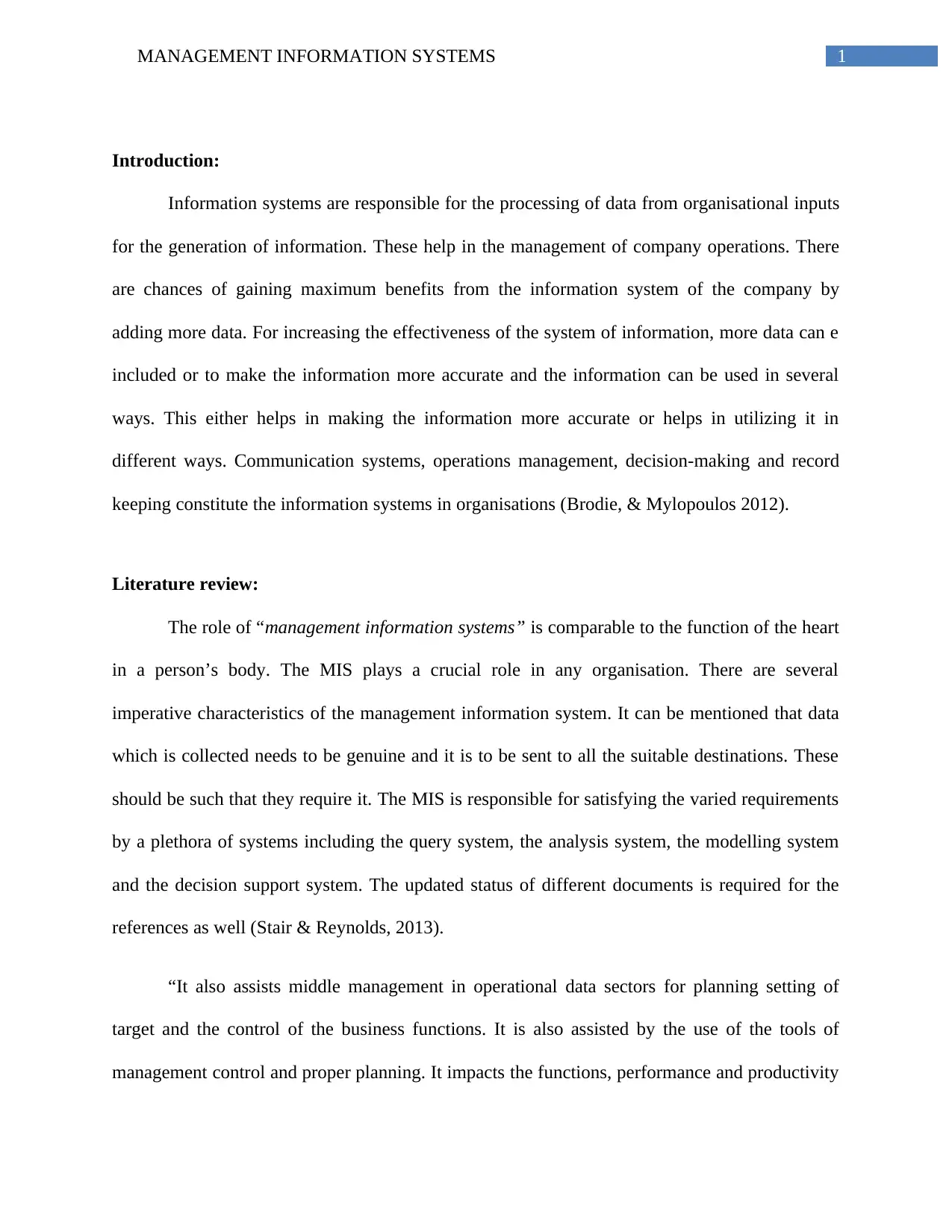
1MANAGEMENT INFORMATION SYSTEMS
Introduction:
Information systems are responsible for the processing of data from organisational inputs
for the generation of information. These help in the management of company operations. There
are chances of gaining maximum benefits from the information system of the company by
adding more data. For increasing the effectiveness of the system of information, more data can e
included or to make the information more accurate and the information can be used in several
ways. This either helps in making the information more accurate or helps in utilizing it in
different ways. Communication systems, operations management, decision-making and record
keeping constitute the information systems in organisations (Brodie, & Mylopoulos 2012).
Literature review:
The role of “management information systems” is comparable to the function of the heart
in a person’s body. The MIS plays a crucial role in any organisation. There are several
imperative characteristics of the management information system. It can be mentioned that data
which is collected needs to be genuine and it is to be sent to all the suitable destinations. These
should be such that they require it. The MIS is responsible for satisfying the varied requirements
by a plethora of systems including the query system, the analysis system, the modelling system
and the decision support system. The updated status of different documents is required for the
references as well (Stair & Reynolds, 2013).
“It also assists middle management in operational data sectors for planning setting of
target and the control of the business functions. It is also assisted by the use of the tools of
management control and proper planning. It impacts the functions, performance and productivity
Introduction:
Information systems are responsible for the processing of data from organisational inputs
for the generation of information. These help in the management of company operations. There
are chances of gaining maximum benefits from the information system of the company by
adding more data. For increasing the effectiveness of the system of information, more data can e
included or to make the information more accurate and the information can be used in several
ways. This either helps in making the information more accurate or helps in utilizing it in
different ways. Communication systems, operations management, decision-making and record
keeping constitute the information systems in organisations (Brodie, & Mylopoulos 2012).
Literature review:
The role of “management information systems” is comparable to the function of the heart
in a person’s body. The MIS plays a crucial role in any organisation. There are several
imperative characteristics of the management information system. It can be mentioned that data
which is collected needs to be genuine and it is to be sent to all the suitable destinations. These
should be such that they require it. The MIS is responsible for satisfying the varied requirements
by a plethora of systems including the query system, the analysis system, the modelling system
and the decision support system. The updated status of different documents is required for the
references as well (Stair & Reynolds, 2013).
“It also assists middle management in operational data sectors for planning setting of
target and the control of the business functions. It is also assisted by the use of the tools of
management control and proper planning. It impacts the functions, performance and productivity
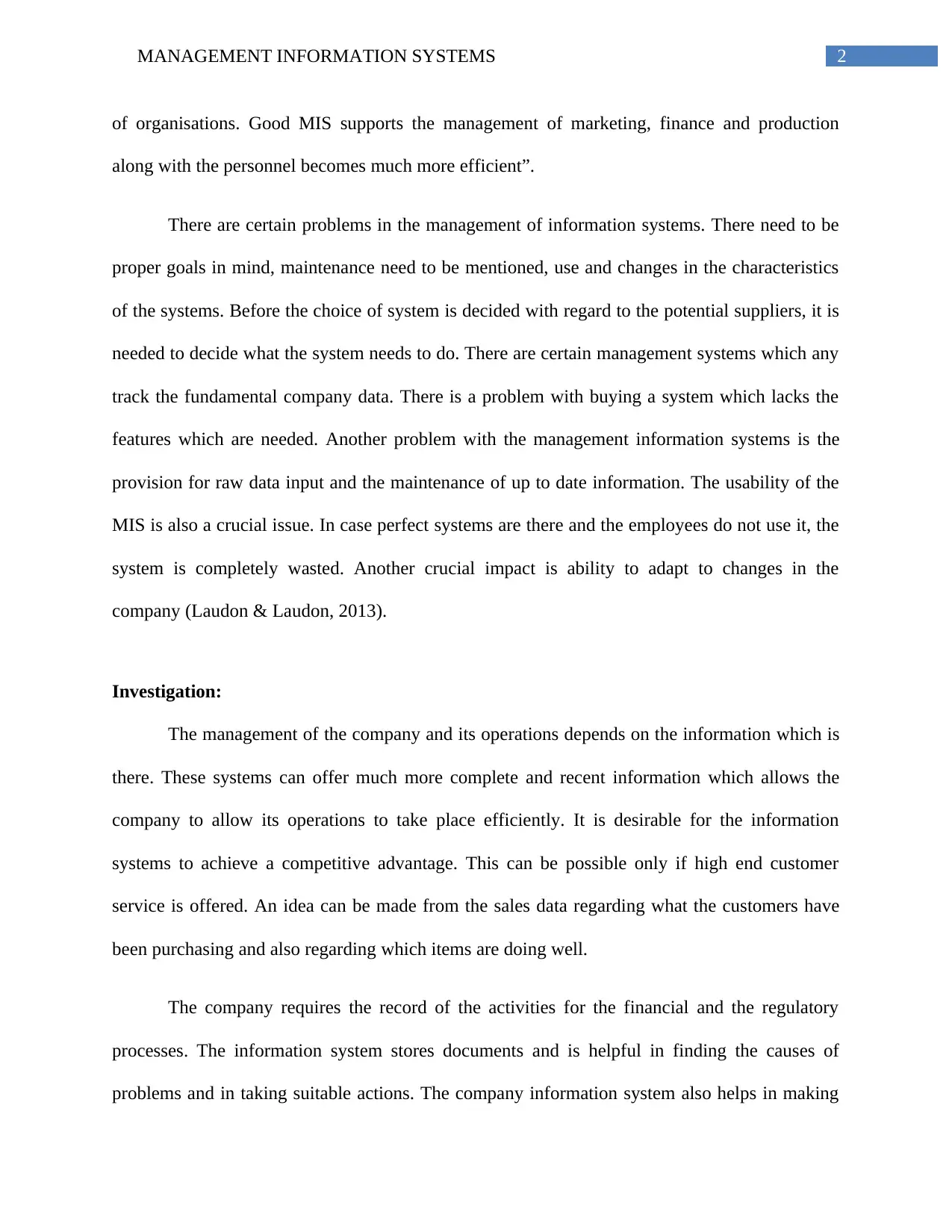
2MANAGEMENT INFORMATION SYSTEMS
of organisations. Good MIS supports the management of marketing, finance and production
along with the personnel becomes much more efficient”.
There are certain problems in the management of information systems. There need to be
proper goals in mind, maintenance need to be mentioned, use and changes in the characteristics
of the systems. Before the choice of system is decided with regard to the potential suppliers, it is
needed to decide what the system needs to do. There are certain management systems which any
track the fundamental company data. There is a problem with buying a system which lacks the
features which are needed. Another problem with the management information systems is the
provision for raw data input and the maintenance of up to date information. The usability of the
MIS is also a crucial issue. In case perfect systems are there and the employees do not use it, the
system is completely wasted. Another crucial impact is ability to adapt to changes in the
company (Laudon & Laudon, 2013).
Investigation:
The management of the company and its operations depends on the information which is
there. These systems can offer much more complete and recent information which allows the
company to allow its operations to take place efficiently. It is desirable for the information
systems to achieve a competitive advantage. This can be possible only if high end customer
service is offered. An idea can be made from the sales data regarding what the customers have
been purchasing and also regarding which items are doing well.
The company requires the record of the activities for the financial and the regulatory
processes. The information system stores documents and is helpful in finding the causes of
problems and in taking suitable actions. The company information system also helps in making
of organisations. Good MIS supports the management of marketing, finance and production
along with the personnel becomes much more efficient”.
There are certain problems in the management of information systems. There need to be
proper goals in mind, maintenance need to be mentioned, use and changes in the characteristics
of the systems. Before the choice of system is decided with regard to the potential suppliers, it is
needed to decide what the system needs to do. There are certain management systems which any
track the fundamental company data. There is a problem with buying a system which lacks the
features which are needed. Another problem with the management information systems is the
provision for raw data input and the maintenance of up to date information. The usability of the
MIS is also a crucial issue. In case perfect systems are there and the employees do not use it, the
system is completely wasted. Another crucial impact is ability to adapt to changes in the
company (Laudon & Laudon, 2013).
Investigation:
The management of the company and its operations depends on the information which is
there. These systems can offer much more complete and recent information which allows the
company to allow its operations to take place efficiently. It is desirable for the information
systems to achieve a competitive advantage. This can be possible only if high end customer
service is offered. An idea can be made from the sales data regarding what the customers have
been purchasing and also regarding which items are doing well.
The company requires the record of the activities for the financial and the regulatory
processes. The information system stores documents and is helpful in finding the causes of
problems and in taking suitable actions. The company information system also helps in making
⊘ This is a preview!⊘
Do you want full access?
Subscribe today to unlock all pages.

Trusted by 1+ million students worldwide
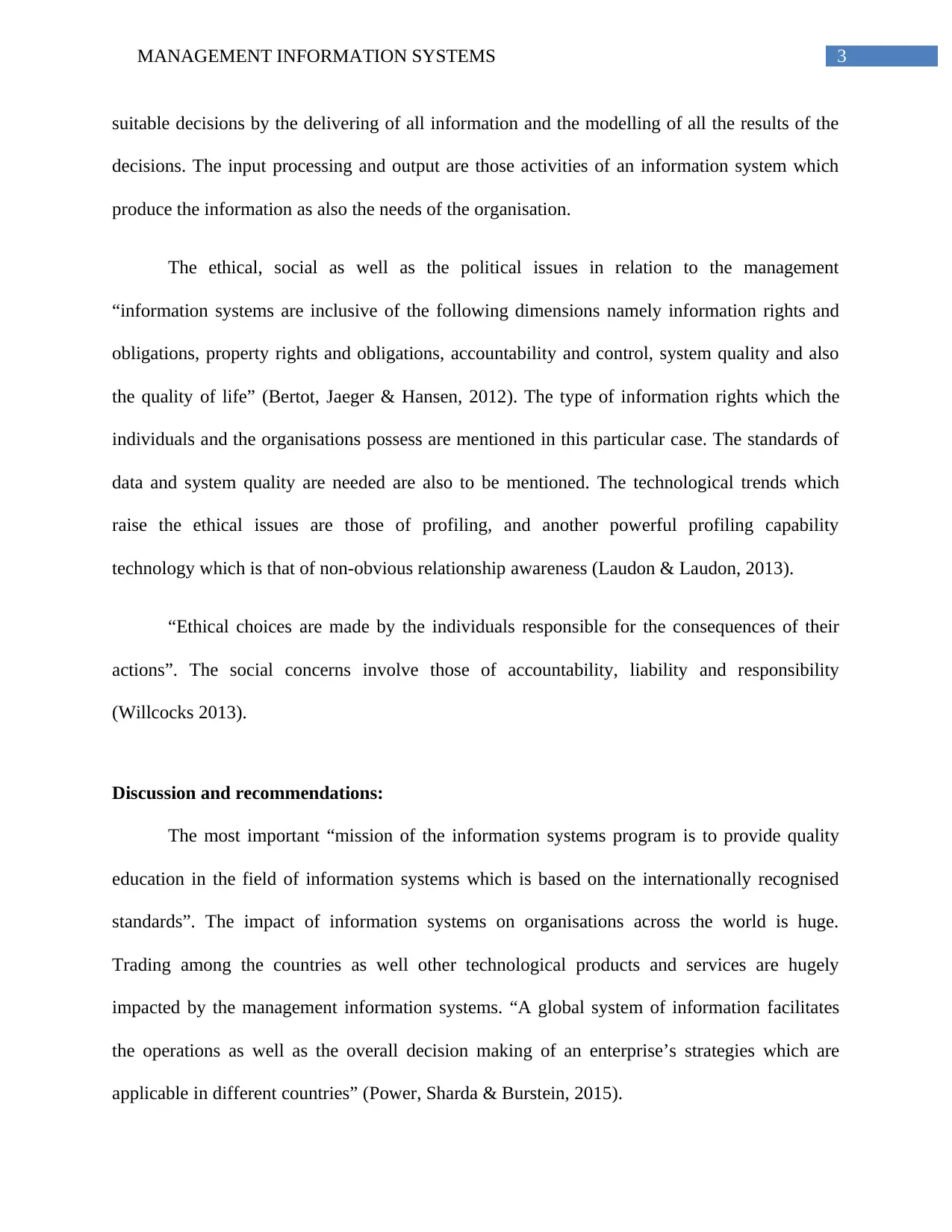
3MANAGEMENT INFORMATION SYSTEMS
suitable decisions by the delivering of all information and the modelling of all the results of the
decisions. The input processing and output are those activities of an information system which
produce the information as also the needs of the organisation.
The ethical, social as well as the political issues in relation to the management
“information systems are inclusive of the following dimensions namely information rights and
obligations, property rights and obligations, accountability and control, system quality and also
the quality of life” (Bertot, Jaeger & Hansen, 2012). The type of information rights which the
individuals and the organisations possess are mentioned in this particular case. The standards of
data and system quality are needed are also to be mentioned. The technological trends which
raise the ethical issues are those of profiling, and another powerful profiling capability
technology which is that of non-obvious relationship awareness (Laudon & Laudon, 2013).
“Ethical choices are made by the individuals responsible for the consequences of their
actions”. The social concerns involve those of accountability, liability and responsibility
(Willcocks 2013).
Discussion and recommendations:
The most important “mission of the information systems program is to provide quality
education in the field of information systems which is based on the internationally recognised
standards”. The impact of information systems on organisations across the world is huge.
Trading among the countries as well other technological products and services are hugely
impacted by the management information systems. “A global system of information facilitates
the operations as well as the overall decision making of an enterprise’s strategies which are
applicable in different countries” (Power, Sharda & Burstein, 2015).
suitable decisions by the delivering of all information and the modelling of all the results of the
decisions. The input processing and output are those activities of an information system which
produce the information as also the needs of the organisation.
The ethical, social as well as the political issues in relation to the management
“information systems are inclusive of the following dimensions namely information rights and
obligations, property rights and obligations, accountability and control, system quality and also
the quality of life” (Bertot, Jaeger & Hansen, 2012). The type of information rights which the
individuals and the organisations possess are mentioned in this particular case. The standards of
data and system quality are needed are also to be mentioned. The technological trends which
raise the ethical issues are those of profiling, and another powerful profiling capability
technology which is that of non-obvious relationship awareness (Laudon & Laudon, 2013).
“Ethical choices are made by the individuals responsible for the consequences of their
actions”. The social concerns involve those of accountability, liability and responsibility
(Willcocks 2013).
Discussion and recommendations:
The most important “mission of the information systems program is to provide quality
education in the field of information systems which is based on the internationally recognised
standards”. The impact of information systems on organisations across the world is huge.
Trading among the countries as well other technological products and services are hugely
impacted by the management information systems. “A global system of information facilitates
the operations as well as the overall decision making of an enterprise’s strategies which are
applicable in different countries” (Power, Sharda & Burstein, 2015).
Paraphrase This Document
Need a fresh take? Get an instant paraphrase of this document with our AI Paraphraser
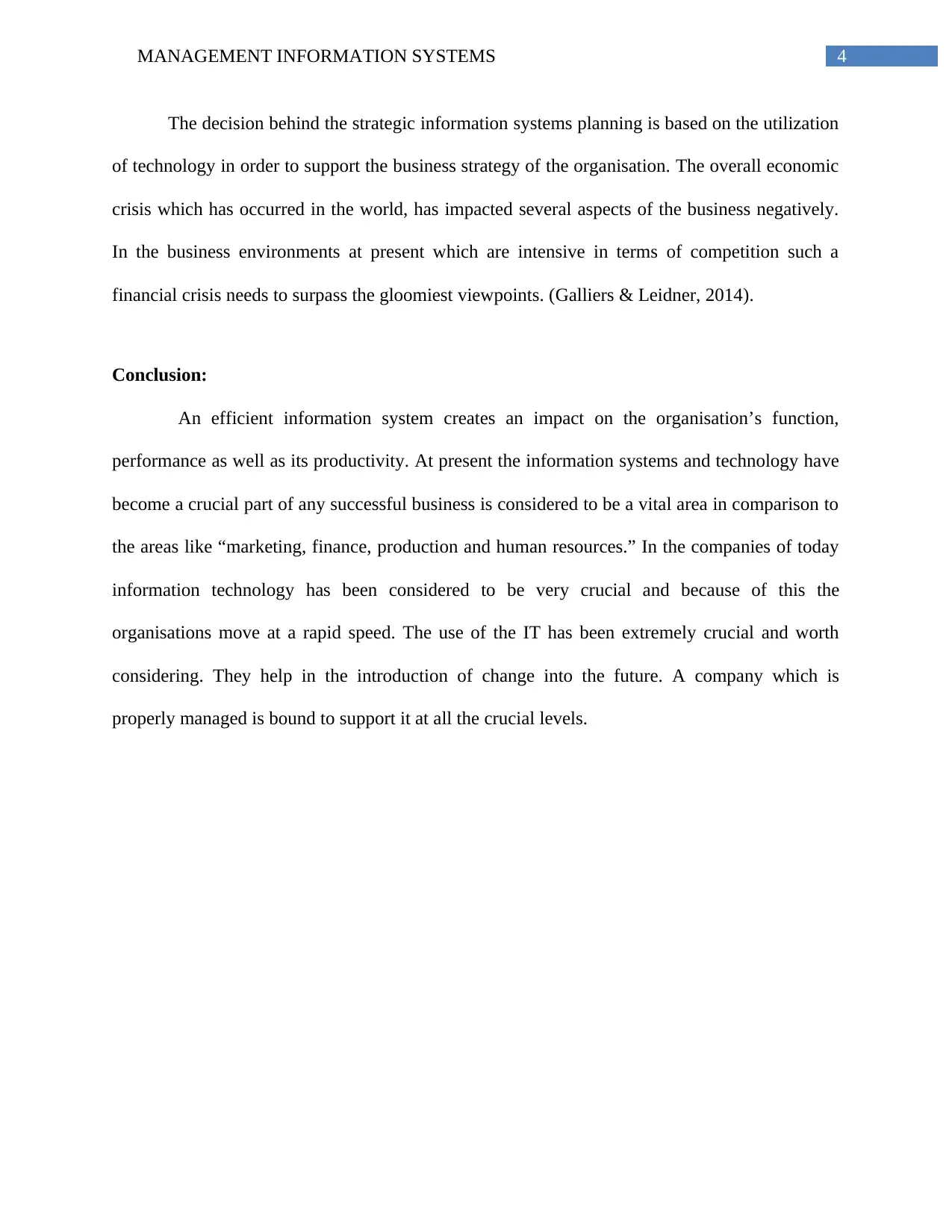
4MANAGEMENT INFORMATION SYSTEMS
The decision behind the strategic information systems planning is based on the utilization
of technology in order to support the business strategy of the organisation. The overall economic
crisis which has occurred in the world, has impacted several aspects of the business negatively.
In the business environments at present which are intensive in terms of competition such a
financial crisis needs to surpass the gloomiest viewpoints. (Galliers & Leidner, 2014).
Conclusion:
An efficient information system creates an impact on the organisation’s function,
performance as well as its productivity. At present the information systems and technology have
become a crucial part of any successful business is considered to be a vital area in comparison to
the areas like “marketing, finance, production and human resources.” In the companies of today
information technology has been considered to be very crucial and because of this the
organisations move at a rapid speed. The use of the IT has been extremely crucial and worth
considering. They help in the introduction of change into the future. A company which is
properly managed is bound to support it at all the crucial levels.
The decision behind the strategic information systems planning is based on the utilization
of technology in order to support the business strategy of the organisation. The overall economic
crisis which has occurred in the world, has impacted several aspects of the business negatively.
In the business environments at present which are intensive in terms of competition such a
financial crisis needs to surpass the gloomiest viewpoints. (Galliers & Leidner, 2014).
Conclusion:
An efficient information system creates an impact on the organisation’s function,
performance as well as its productivity. At present the information systems and technology have
become a crucial part of any successful business is considered to be a vital area in comparison to
the areas like “marketing, finance, production and human resources.” In the companies of today
information technology has been considered to be very crucial and because of this the
organisations move at a rapid speed. The use of the IT has been extremely crucial and worth
considering. They help in the introduction of change into the future. A company which is
properly managed is bound to support it at all the crucial levels.
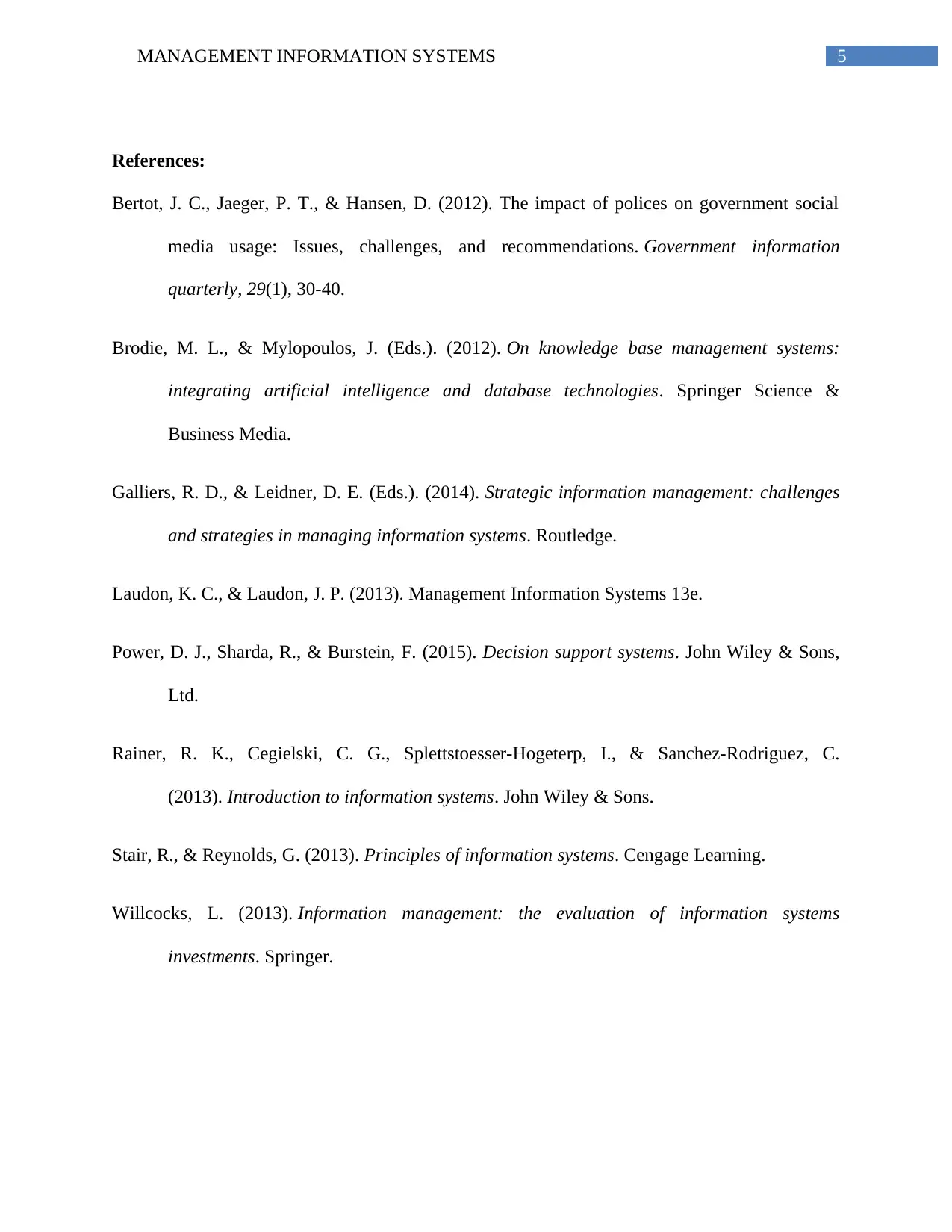
5MANAGEMENT INFORMATION SYSTEMS
References:
Bertot, J. C., Jaeger, P. T., & Hansen, D. (2012). The impact of polices on government social
media usage: Issues, challenges, and recommendations. Government information
quarterly, 29(1), 30-40.
Brodie, M. L., & Mylopoulos, J. (Eds.). (2012). On knowledge base management systems:
integrating artificial intelligence and database technologies. Springer Science &
Business Media.
Galliers, R. D., & Leidner, D. E. (Eds.). (2014). Strategic information management: challenges
and strategies in managing information systems. Routledge.
Laudon, K. C., & Laudon, J. P. (2013). Management Information Systems 13e.
Power, D. J., Sharda, R., & Burstein, F. (2015). Decision support systems. John Wiley & Sons,
Ltd.
Rainer, R. K., Cegielski, C. G., Splettstoesser-Hogeterp, I., & Sanchez-Rodriguez, C.
(2013). Introduction to information systems. John Wiley & Sons.
Stair, R., & Reynolds, G. (2013). Principles of information systems. Cengage Learning.
Willcocks, L. (2013). Information management: the evaluation of information systems
investments. Springer.
References:
Bertot, J. C., Jaeger, P. T., & Hansen, D. (2012). The impact of polices on government social
media usage: Issues, challenges, and recommendations. Government information
quarterly, 29(1), 30-40.
Brodie, M. L., & Mylopoulos, J. (Eds.). (2012). On knowledge base management systems:
integrating artificial intelligence and database technologies. Springer Science &
Business Media.
Galliers, R. D., & Leidner, D. E. (Eds.). (2014). Strategic information management: challenges
and strategies in managing information systems. Routledge.
Laudon, K. C., & Laudon, J. P. (2013). Management Information Systems 13e.
Power, D. J., Sharda, R., & Burstein, F. (2015). Decision support systems. John Wiley & Sons,
Ltd.
Rainer, R. K., Cegielski, C. G., Splettstoesser-Hogeterp, I., & Sanchez-Rodriguez, C.
(2013). Introduction to information systems. John Wiley & Sons.
Stair, R., & Reynolds, G. (2013). Principles of information systems. Cengage Learning.
Willcocks, L. (2013). Information management: the evaluation of information systems
investments. Springer.
⊘ This is a preview!⊘
Do you want full access?
Subscribe today to unlock all pages.

Trusted by 1+ million students worldwide
1 out of 6
Related Documents
Your All-in-One AI-Powered Toolkit for Academic Success.
+13062052269
info@desklib.com
Available 24*7 on WhatsApp / Email
![[object Object]](/_next/static/media/star-bottom.7253800d.svg)
Unlock your academic potential
Copyright © 2020–2025 A2Z Services. All Rights Reserved. Developed and managed by ZUCOL.





